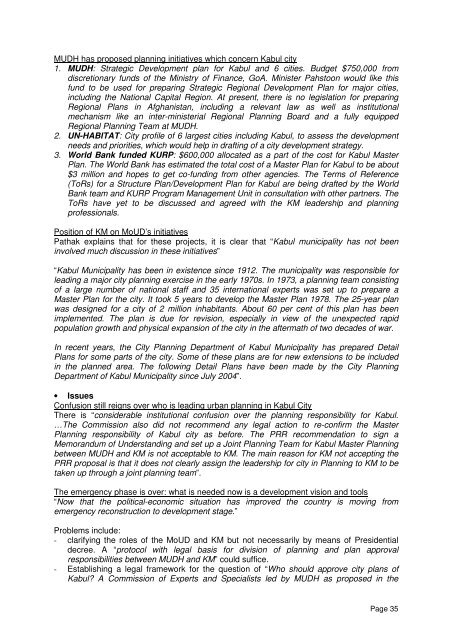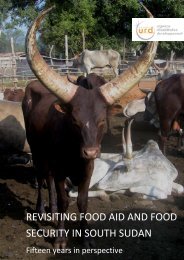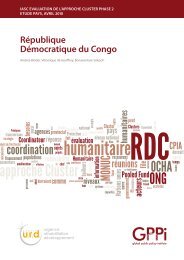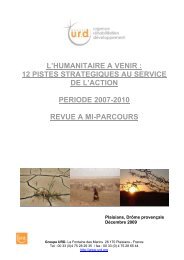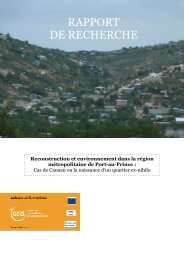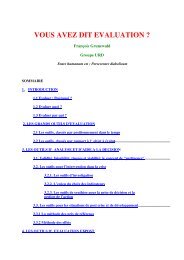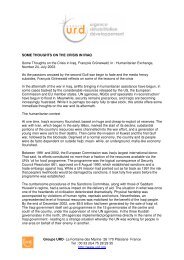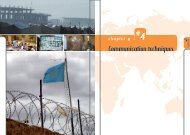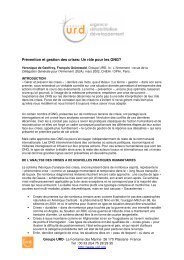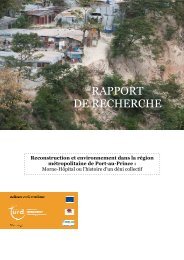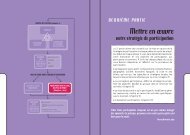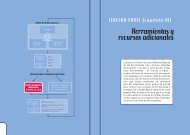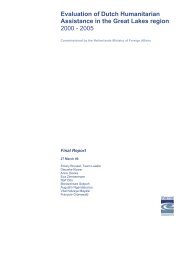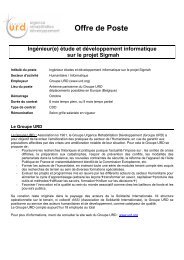Kabul Urban Survey - Groupe URD
Kabul Urban Survey - Groupe URD
Kabul Urban Survey - Groupe URD
Create successful ePaper yourself
Turn your PDF publications into a flip-book with our unique Google optimized e-Paper software.
MUDH has proposed planning initiatives which concern <strong>Kabul</strong> city<br />
1. MUDH: Strategic Development plan for <strong>Kabul</strong> and 6 cities. Budget $750,000 from<br />
discretionary funds of the Ministry of Finance, GoA. Minister Pahstoon would like this<br />
fund to be used for preparing Strategic Regional Development Plan for major cities,<br />
including the National Capital Region. At present, there is no legislation for preparing<br />
Regional Plans in Afghanistan, including a relevant law as well as institutional<br />
mechanism like an inter-ministerial Regional Planning Board and a fully equipped<br />
Regional Planning Team at MUDH.<br />
2. UN-HABITAT: City profile of 6 largest cities including <strong>Kabul</strong>, to assess the development<br />
needs and priorities, which would help in drafting of a city development strategy.<br />
3. World Bank funded KURP: $600,000 allocated as a part of the cost for <strong>Kabul</strong> Master<br />
Plan. The World Bank has estimated the total cost of a Master Plan for <strong>Kabul</strong> to be about<br />
$3 million and hopes to get co-funding from other agencies. The Terms of Reference<br />
(ToRs) for a Structure Plan/Development Plan for <strong>Kabul</strong> are being drafted by the World<br />
Bank team and KURP Program Management Unit in consultation with other partners. The<br />
ToRs have yet to be discussed and agreed with the KM leadership and planning<br />
professionals.<br />
Position of KM on MoUD’s initiatives<br />
Pathak explains that for these projects, it is clear that “<strong>Kabul</strong> municipality has not been<br />
involved much discussion in these initiatives”<br />
“<strong>Kabul</strong> Municipality has been in existence since 1912. The municipality was responsible for<br />
leading a major city planning exercise in the early 1970s. In 1973, a planning team consisting<br />
of a large number of national staff and 35 international experts was set up to prepare a<br />
Master Plan for the city. It took 5 years to develop the Master Plan 1978. The 25-year plan<br />
was designed for a city of 2 million inhabitants. About 60 per cent of this plan has been<br />
implemented. The plan is due for revision, especially in view of the unexpected rapid<br />
population growth and physical expansion of the city in the aftermath of two decades of war.<br />
In recent years, the City Planning Department of <strong>Kabul</strong> Municipality has prepared Detail<br />
Plans for some parts of the city. Some of these plans are for new extensions to be included<br />
in the planned area. The following Detail Plans have been made by the City Planning<br />
Department of <strong>Kabul</strong> Municipality since July 2004”.<br />
• Issues<br />
Confusion still reigns over who is leading urban planning in <strong>Kabul</strong> City<br />
There is “considerable institutional confusion over the planning responsibility for <strong>Kabul</strong>.<br />
…The Commission also did not recommend any legal action to re-confirm the Master<br />
Planning responsibility of <strong>Kabul</strong> city as before. The PRR recommendation to sign a<br />
Memorandum of Understanding and set up a Joint Planning Team for <strong>Kabul</strong> Master Planning<br />
between MUDH and KM is not acceptable to KM. The main reason for KM not accepting the<br />
PRR proposal is that it does not clearly assign the leadership for city in Planning to KM to be<br />
taken up through a joint planning team”.<br />
The emergency phase is over: what is needed now is a development vision and tools<br />
“Now that the political-economic situation has improved the country is moving from<br />
emergency reconstruction to development stage.”<br />
Problems include:<br />
- clarifying the roles of the MoUD and KM but not necessarily by means of Presidential<br />
decree. A “protocol with legal basis for division of planning and plan approval<br />
responsibilities between MUDH and KM” could suffice.<br />
- Establishing a legal framework for the question of “Who should approve city plans of<br />
<strong>Kabul</strong>? A Commission of Experts and Specialists led by MUDH as proposed in the<br />
Page 35


